New data shows “incredible” sustainability of HBC experimental varieties versus classic craft hops
Learn about the technical and sensory results on HBC experimental varieties HBC 638, HBC 522, and HBC 1134 that could supplement and even replace some classic varieties to improve sustainability.
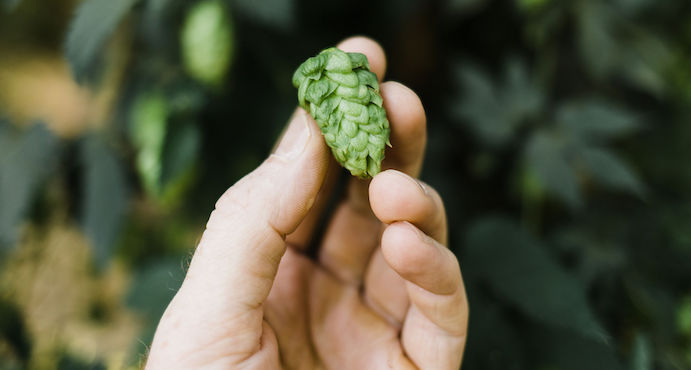
On November 3, 2023, the Washington Brewers Guild held its annual Craft Beer Summit in Puyallup, Washington. During the expo, HBC, the Hop Breeding Company—which is a joint venture between John I. Haas and Yakima Chief Ranches—hosted a panel discussion on “Driving Sustainability through Advanced Hop Technologies.”
The panel included Jeff Dailey, Sensory Manager at John I. Haas; Ryan Christian and Ashley Hale of Yakima Chief Ranches; and Shanleigh Thomson, brewing consultant and educator.
“Craft brewing and its rise owes everything to the classic ‘C-Hops.’ The release and adoption of Cascade and Centennial especially, but also Chinook and Columbus, transformed the market and elevated hop flavor-forward beers to the public’s attention,” said Jeff. “At the same time, any brewer looking to produce balanced lagers has been limited in their options—using noble hops like Saaz and Mittelfrüh are prerequisites to those styles of beer. Unfortunately, these varieties are all highly susceptible to stressors caused by climate change,” he continued. “This panel was designed to share technical and sensory results on HBC experimental varieties that could supplement and even replace some of these classic varieties to improve sustainability.”
These new experimental hops, HBC 638, HBC 522, and HBC 1134, yield more pounds of hops per acre than their classic counterparts, Centennial, Cascade, and Saaz, with far less inputs.
Jeff went on, “These historical varieties have significantly lower yields on a year-by-year basis than the experimental hops that we’re bringing through the HBC program.”
“Take HBC 638, for example. At a sensory level, it’s a partial if not a full replacement for Centennial. On a per acre basis, the ten-year average yield is 1,700 more pounds—using the same inputs—as Centennial. In a good year, Centennial yields 1,700 pounds per acre, but in a year like 2023, which will become more common due to climate change, Centennial easily yielded 25% below that. So, these HBC varieties are incredible sustainability story.”
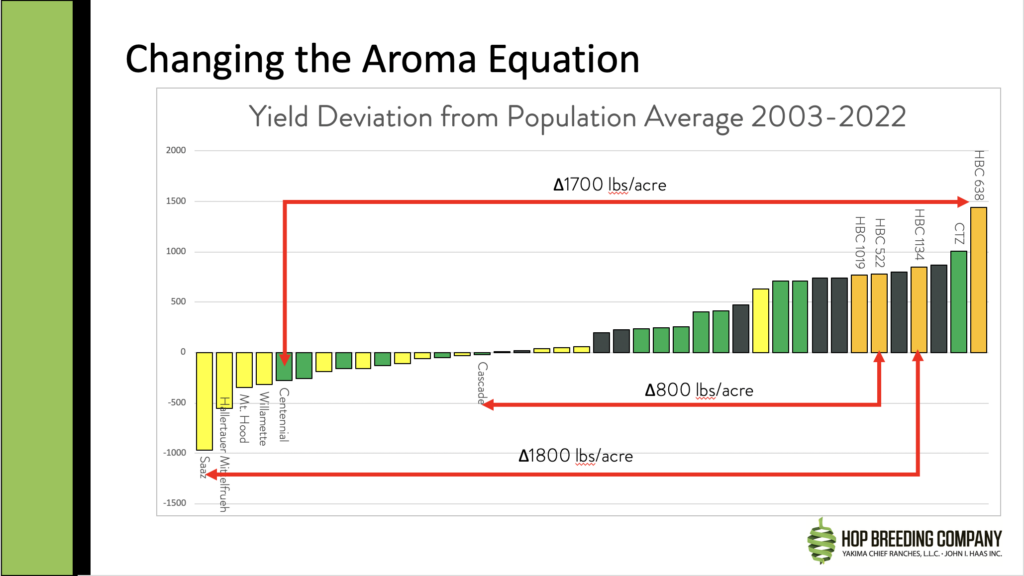
Credit: Ryan Christian, YCR/HBC
“Similarly, over the last ten years, HBC 522 produced on average 800 more pounds per acre per year as compared to Cascade,” Jeff added. “Then there’s the big one, HBC 1134, which produces 1,800 more pounds per acre per year than Saaz.”
“Saaz is particularly interesting as it is a major lager variety grown in Europe, whereas HBC 1134 is produced locally in the Pacific Northwest,” said Jeff. “So, for many brewers throughout North America, there is a significant reduction in the carbon footprint associated with the import process, not to mention shipping costs.”
“You want to know what sustainability looks like? This is it,” said Jeff.
The sensory data is equally surprising.
“When we set out to do this initial sensory evaluation, I was skeptical.” But the charts that emerged, told another surprising story.
“The sensory data I presented was from a panel that we ran comparing recently harvested HBC 522 with Cascade. While the sensory profiles are not a perfect match, you can see that they overlap really well.”
The same was true of HBC 638 and Centennial. Jeff also ran HBC 1134 against another HBC hop that was originally flagged for its unique lager characteristics. This served to highlight the progress HBC has made in breeding for old-world characteristics.
“This kind of matching, it’s really astonishing,” Jeff noted. “We still need to do more brewing trials—but I think we’re onto something here.”
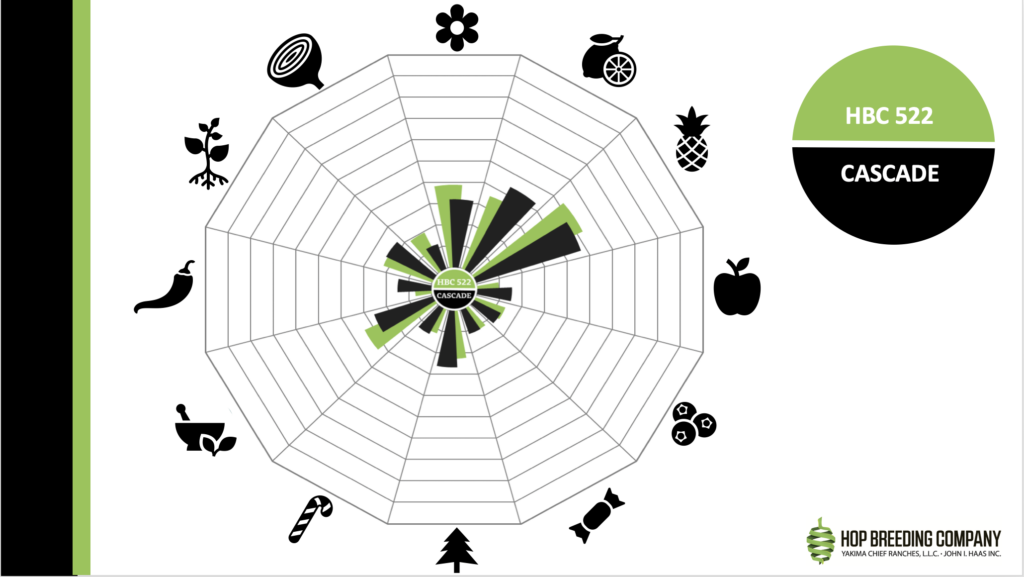
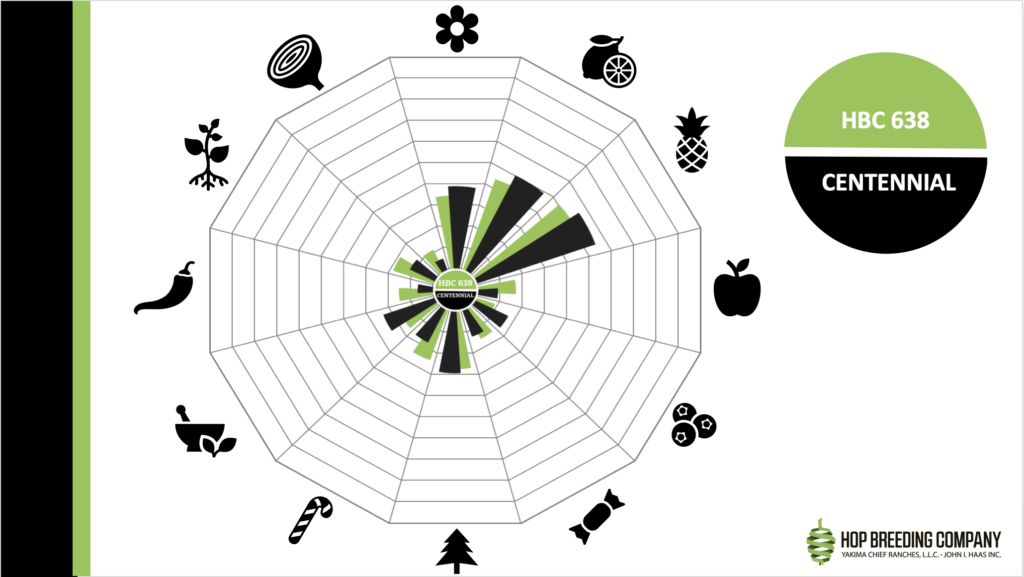
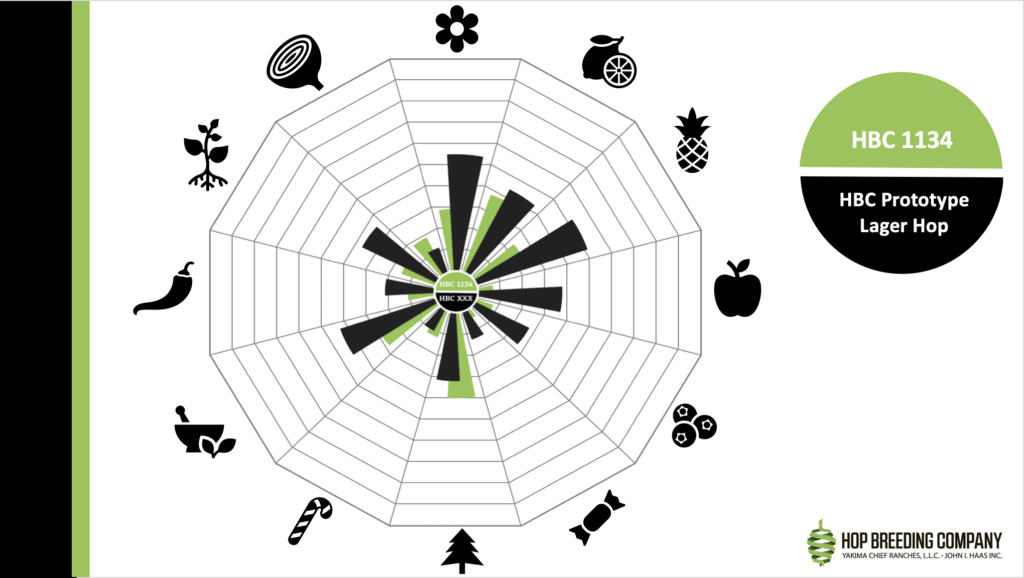
Sensory impact as a sustainability tool.
The final variety the panel showed was brand new, HBC 1019. This hop has its own sustainability story. “The agronomics are great,” said Jeff. “It yields about 2,500 pounds per acre, well above our threshold of 2,000 pounds.”
But the compelling part of HBC 1019 is its sensory profile: caramelized pineapple, fleshy peach, tangerine, and melon. This unique profile and its aromatic impact are something special.
“A brewer can expect a more unique, more intensely flavored beer using fewer hops,” Jeff explained. “That translates to less loss of salable beer, but also less total suspended solids and biological oxygen demand in the brewhouse waste stream. This really affects the ecological impact caused by brewery effluence—which has financial impact for breweries spending money to treat their waste streams and paying fees to local wastewater districts.”
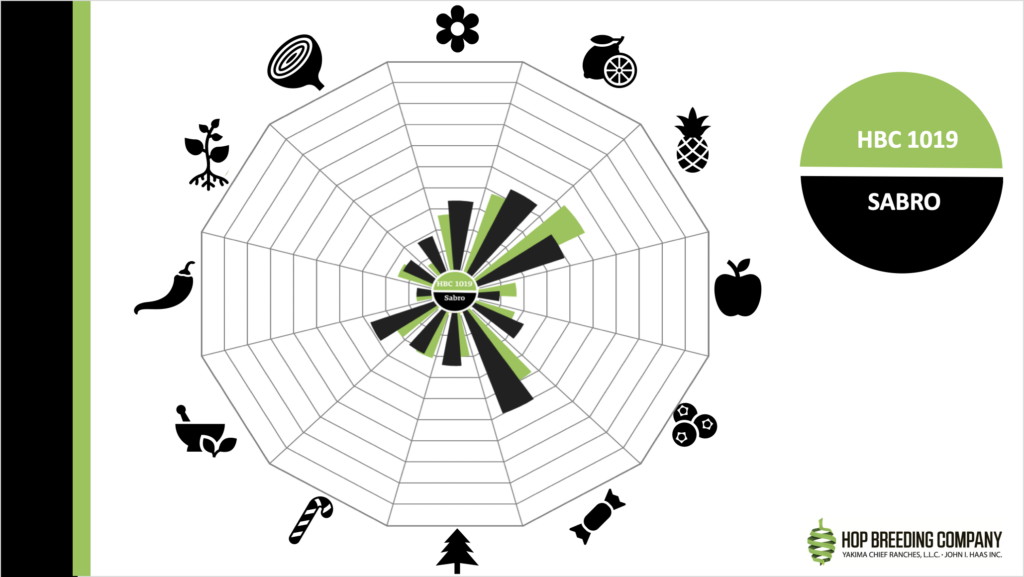
The human factor.
During the Craft Beer Summit, Jeff and the HBC panelists put out samples of the hops so that approximately 50 attendees could evaluate whole cone samples of the HBC varieties for themselves and provide feedback.
“All of the combined data we’re seeing suggests that we can achieve these same, highly desirable flavors in a much, much more sustainable way,” Jeff continued. “This is the story our HBC team has been exploring. We’ve bred three hops that are proving to be great replacements for these classic hop flavors and aromas. But we’re also continuing to explore the world of unique flavors—this is the House that Citra built, after all—while doing what we can to limit our impact on the climate.”
To learn more about these HBC experimental hops, contact your local HAAS representative or HAAS distributor. Or explore the full lineup of HAAS hops here.
Cheers!



